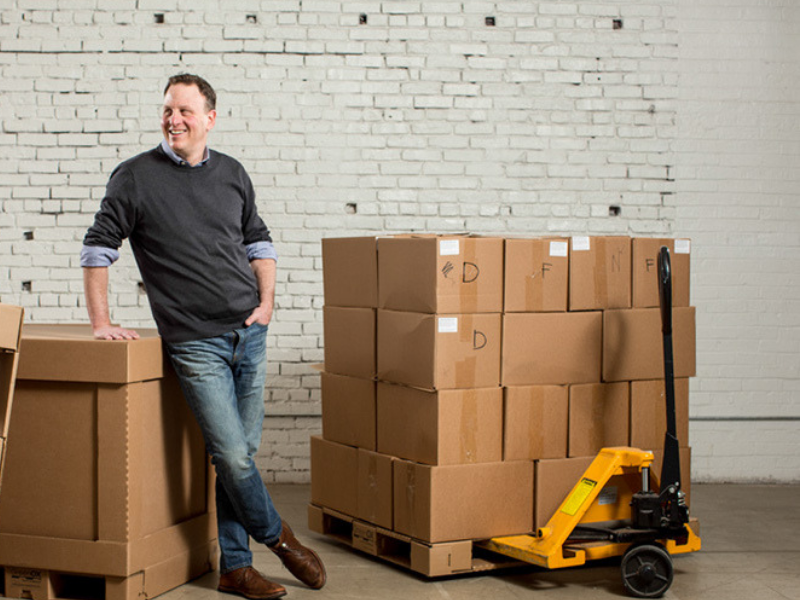Adam Pener: “a change to cardboard pallets results in some upfront costs, but the ROI is massive. Just ask IKEA”
Adam Pener has dedicated his professional career to the business world. First to lead projects independently and later as president of a cardboard pallet company in the USA. In 2015 he founded and led “Change the Pallet”. It is a non-profit organization that aims to reduce CO2 emissions on a massive scale by changing the model and the use of wood and plastic pallets for cardboard pallets.
How did the idea of Change the Pallet (CTP) come about?
We surveyed the Top-100 U.S. retailers and grocers and were surprised to learn that most of these leading U.S. companies prohibited shipments to their facilities on corrugated pallets. The same goes for the U.S. Department of Defense. We launched CTP to shine light on these exclusionary policies that have the effect of blackballing corrugated pallets from the U.S. market. Markets are free to choose what technology to employ, of course, but in this case the planet and taxpayers bear the environmental and economic toll. That was a story that needed to be told.
What has been the evolution of CTP?
Change the Pallet does not manufacture or sell cardboard pallets. Our sole purpose is to advocate for their use because of the proven ability of corrugated pallets to reduce waste, carbon emissions, and worker injuries. We are motivated by a simple idea: a win for the cardboard pallet industry is a win for the environment and taxpayers.
CTP has operated as a nonprofit since our launch in 2015 and was recently awarded formal 501(c)(3) status. This status provides a unique platform, enabling us to cultivate partnerships, dialogues, and messaging typically unavailable to companies whose motives are driven by profit. We do not promote or elevate any one pallet manufacturer but rather the corrugated pallet industry.
What are some important initiatives that your nonprofit has been focusing on?
Our initiatives vary in design and specific objective, but all seek to trigger major precedents of the type that will lead to systemic change. Our university initiative is a great example. Millions of pallets are delivered to university campuses each year. What’s stopping administrators from telling, or at least asking, for those pallets to be recyclable corrugated ones?
At the request of several universities, we are now coordinating a list of signatories to a letter that will be sent to leading vendors such as Office Depot, Nike and Apple. The letter asks for these companies to ship to campuses on recyclable corrugated pallets.
Universities are often the birthplace of progress and innovation, and we fully expect that when “name” clients such as Harvard, for example, asks for corrugated pallets, the companies that cash the checks will oblige.
Our favorite part of this initiative, however, is how it has captured the imagination of students that want to participate in cutting edge efforts to actually cut emissions versus simply talking about climate change. Recently, Haverford College’s Committee on Environmental Responsibility became our first formal outreach partner. Students engaging students is a recipe for change.
When a big company like IKEA uses cardboard pallets, is it easier for other companies to bet on it?
Intuitively, yes, but that hasn’t been the case in practice. What makes this more curious are the numbers, which are proven — and eyepopping. For example, cardboard pallets enable IKEA to fit more product on trucks, resulting in 50,000 to 100,000 fewer truck trips each year. They have reported 75,000 fewer metric tons of carbon emissions per year and annual savings of over $200 million in shipping costs alone.
IKEA’s program began with a straightforward directive to suppliers: ship to us on corrugated pallets. The fact that not one retailer worldwide has followed suit is highly perplexing, especially given IKEA’s reported savings and reduced carbon footprint.
This is why we’re asking universities to lead: if Fortune 500 companies won’t adopt the more sustainable product transport system, our thinking is that their clients should demand change through their procurement dollars. We would love leading Spanish universities to join the campaign!
What do you think are the benefits of companies using cardboard pallets?
IKEA’s use of cardboard pallets has proven that global implementation is not only possible, but that it results in waste reduction, fewer emissions, reduced trucking miles, cost savings, and fewer worker injuries. Imagine if companies like Dell, HP, Nike, and Apple began implementing paper pallets into their supply chain. We estimate that Apple airfreights more than one million wood pallets / year at ~30 pounds each. It’s not hard to do the math on emissions or cost savings if those shipments were on 12-pound corrugated pallets.
But CTP thinks bigger: it’s a game-changer if companies like Walmart and Target copy IKEA and reduced their trucks on the road by 20-30 percent per year, or if Amazon cuts its carbon footprint by 20% reduction by using cardboard pallets.
Yes, initiating a change to cardboard pallets results in some upfront costs, but the ROI is massive. Just ask IKEA.
What would you say to companies that may be skeptical of cardboard pallets? Do you think that cardboard pallets are suitable to all companies/sectors?
We would say start upstream. Companies, universities, governments and nonprofits all have one thing in common: they order supplies by the pallet load. In doing so, they write the checks and, as we all know, the customer is always right. IKEA has gone from zero corrugated pallets per year to 34 million shipments. It started with a decision to tell upstream suppliers to ship on corrugated pallets instead of wood.
In addition to changing the pallet, should companies change their mindset about sustainability?
One hundred percent. Today’s students are tomorrow’s customers and this upcoming generation has demonstrated a passionate commitment to sustainability.
Do you believe the Alpesa´s commitment to sustainability and the strength of its model can attract companies in both the European and U.S. market?
Absolutely. The key to advancing cardboard pallet technology is in providing a more sustainable product that is also strong and capable of getting the job done right. A pallet, such as Úpalet, which is made from 100% recycled cardboard, weighs 90% less than the average wood or plastic pallet, and can carry up to 13,000 pounds is exemplary of the type of pallet that can help companies become more sustainable, while reducing costs and worker injuries.
Unfortunately, even a great cardboard pallet product has an uphill battle in the U.S. market, since most major retailers and grocers in the U.S. don’t allow their suppliers to ship on cardboard pallets – which brings us back to Change the Pallet, and why our advocacy work is so important.
Our advice to European companies and governments is simple: you are leading the world on many sustainable initiatives and it’s likely the case that you’ll need to lead on pallets. As plastic straws have proven, if Europe leads in banning environmentally-destructive practices, U.S. companies will rapidly follow suit.




